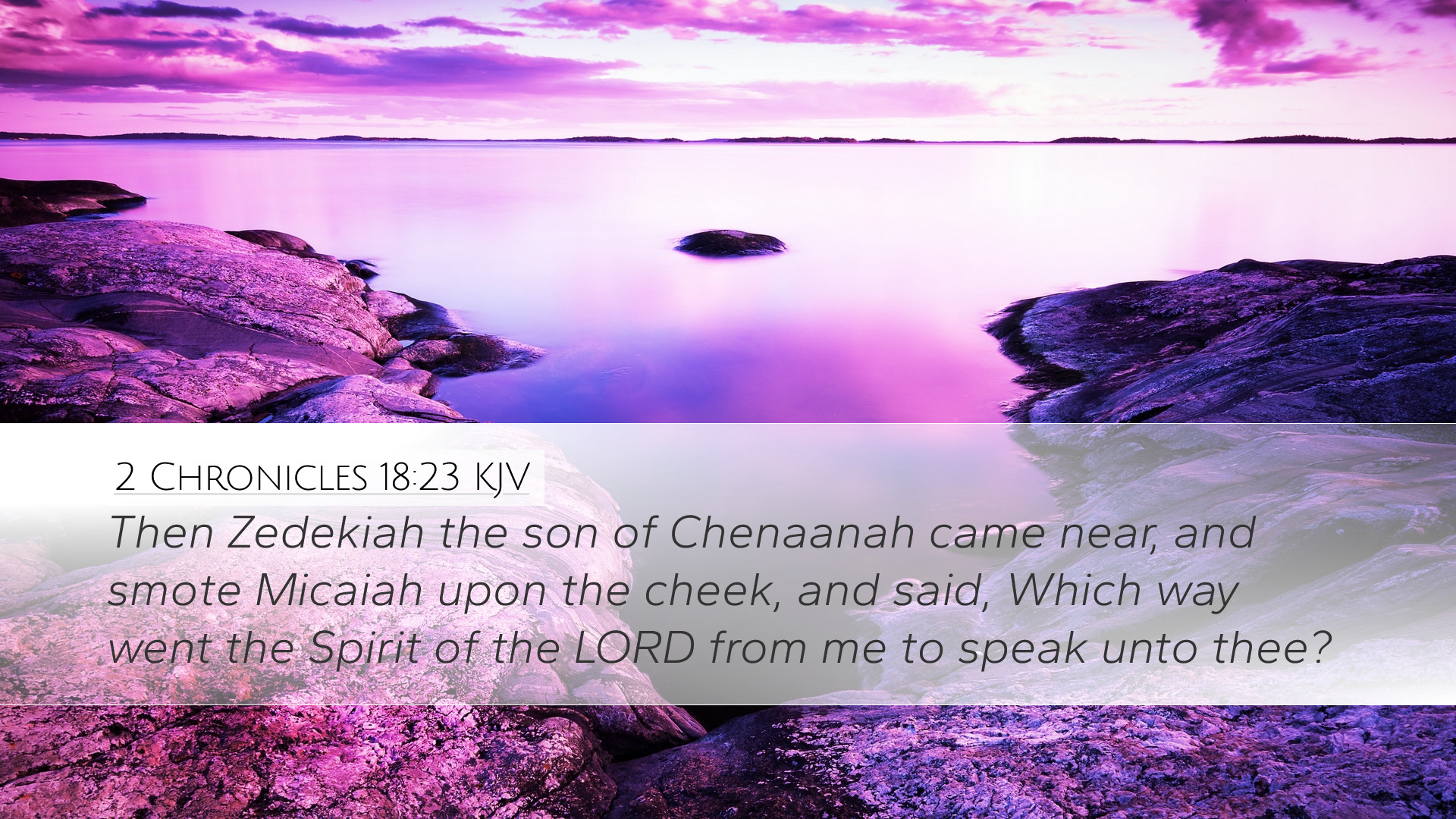Commentary on 2 Chronicles 18:23
Verse Reference: 2 Chronicles 18:23
Text: "And Zedekiah the son of Chenaanah came near, and smote Micaiah upon the cheek, and said, Which way went the Spirit of the LORD from me to speak unto thee?"
Introduction
The verse presents an intense moment in the interaction between the prophet Micaiah and the false prophet Zedekiah. This confrontation encapsulates the broader theme of prophetic authenticity versus falsehood, a discussion that is critical to the understanding of spiritual authority and the integrity of divine messages.
Contextual Overview
This passage falls within the narrative of King Jehoshaphat of Judah's alliance with Ahab, king of Israel. The background of this alliance and the war against Ramoth-Gilead is vital for understanding the drama at play here. The prophets of Ahab, including Zedekiah, provide a stark contrast to the solitary voice of Micaiah, who represents the true word of the Lord.
Verse Analysis
The Confrontation
The act of Zedekiah striking Micaiah speaks volumes about the nature of prophetic authority in ancient Israel. According to Matthew Henry, this physical aggression symbolizes the rejection of God's truth in favor of human authority and power. Zedekiah's violence indicates a desperation to silence genuine prophecy, showing the lengths to which those entrenched in falsehood will go to maintain their position.
Questioning the Spirit
In querying, "Which way went the Spirit of the LORD from me to speak unto thee?", Zedekiah exposes his misunderstanding of divine communication. The Albert Barnes commentary highlights that Zedekiah misidentifies the source of the prophecy, implying that his visions and prophetic utterances are equally valid. This reflects a common theme where false prophets claim authority without true divine backing, suggesting that the Spirit can be manipulated or controlled by man—a dangerous theological error.
Micaiah's Role
Micaiah, in contrast, embodies the courageous spirit of a true prophet. Adam Clarke notes that his steadfastness in delivering the vision of the Lord, despite knowing it would incite hostility, marks him as a true servant of God. Micaiah’s unwavering commitment to truth, despite personal risk, serves as a profound lesson for both current and aspiring leaders within the church.
Implications for Spiritual Leaders
The account of Micaiah vs. Zedekiah underscores the necessity for pastors and leaders today to discern authentic spiritual guidance from the multitude of voices that attempt to sway the church. The confrontation serves as a reminder of the challenges faced when standing for truth amidst prevailing cultural and ecclesiastical pressures.
The Importance of Discernment
- Discernment of Spirit: It is crucial that spiritual leaders develop an acute awareness of the authenticity of the messages they receive and share.
- Courage in Truth: Like Micaiah, leaders must be prepared to stand alone in their convictions, championing the messages that align with God's will regardless of opposition.
- Understanding Human Nature: Zedekiah's actions remind leaders of the potential for hostility when confronting those who prefer comfort over challenge.
Theological Reflections
This passage invites deeper theological reflection on the nature of revelation and the human condition. Micaiah’s integrity in proclaiming God’s message amid hostility offers a lens through which to understand the divine demands placed upon leaders; that is to speak truth in love while also being prepared for suffering.
Conclusion
2 Chronicles 18:23 reminds us of the enduring conflict between truth and falsehood within spiritual leadership. As seen through the interactions of Micaiah and Zedekiah, the essence of prophetic ministry entails a commitment to truth that can lead to conflict, yet it is through this commitment that the church can continue to discern and fulfill the will of God in a world full of competing voices.
As you reflect on this passage, consider the implications for your own ministry, teachings, and understanding of divine guidance. The integrity required in proclaiming God’s Word remains as relevant today as it was in the days of the kings of Israel and Judah.


